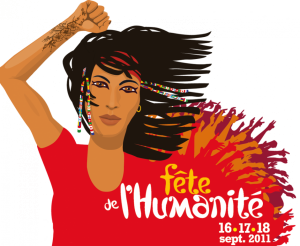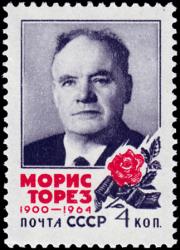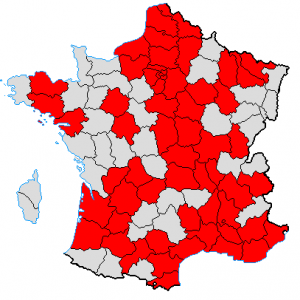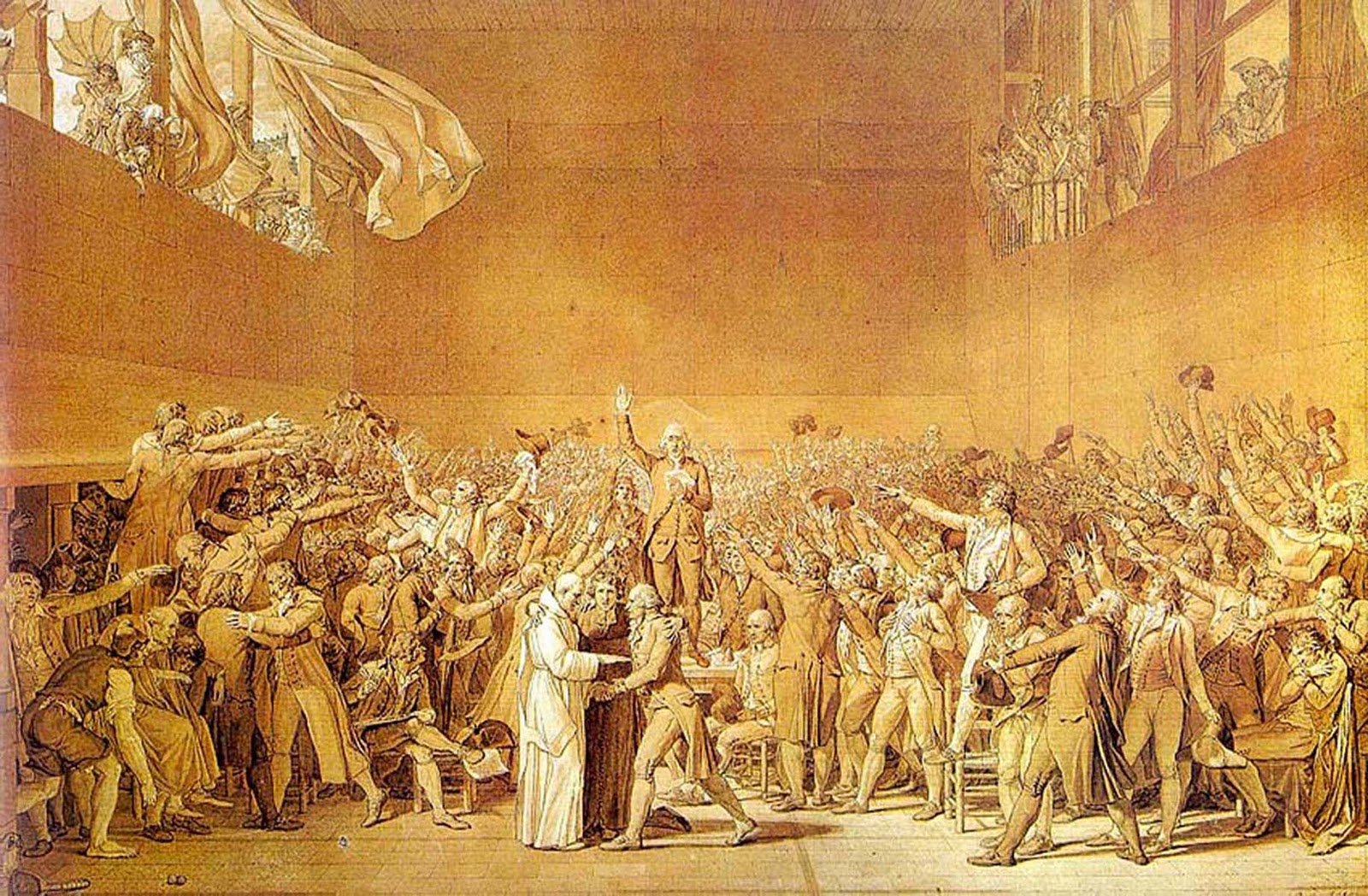The Parti communiste français or, for us impoverished monoglots, the French Communist Party, was founded in the aftermath of the Russian Revolution and has seen many highs (the anti-fascist struggle) and lows (the decline in the 1990s).
Unlike most of the far left parties in the Anglo-sphere, the communist parties in the western Europe managed to grow and sustain mass support, counted in the millions.
Emerging from World War 2 as the central organisation behind the resistence, the French communists (PCF) reaped the benefits and won nearly 30% in the post war elections. However, it was excluded from power in 1947.
Below, we interview in a personal capacity, the PCF’s Gael Le Mignot on the current situation in France, the PCF and its role in the social struggle.
Emerging from WW II, the PCF was the leading socialist party for some decades and In the 1970s, along with the main western European Communist Parties, adopted eurocommunism in a bid to win power legally. In France, however, Mitterrand and the Socialist Party reaped the rewards instead. What happened?
In 1974, there was a programme commun between the Socialist Party (PS) and the PCF, very similar to the “Unitad Popular” of Allende in Chile. The objective was to get power, and “bring France in the tracks of socialism”. For that, the PCF backed the PS candidate, Mitterrand, who was more likely to win. But in 1974, we lost the election, by a very thin margin (49.1% against 50.9%), but we lost it.
In 1981, the PS didn’t continue on the programme commun. They became much less radical, and presented Miterrand on their own program. The PCF presented its own candidate, Marchais who won 15%, with Miterrand receiving 25%. In the second round, Miterrand won.
From 1981 until 1983, it didn’t start too bad. Communists were in the government, and significant progress was made on issues like retirement at 60, a 5th week of paid holidays, abolition of death penalty, nationalisation of banks and industries, and so on.
But when international finance started to attack the national currency, the Franc, and to leak capital, Miterrand gave up this left-wing policy, and in order to stay in the European Monetary System, he capitulated, announcing the tournant de la rigueur (austerity policy). Communists left the government, and it was the end of the dream that started with the programme commun.
How did the fall of the USSR affect the PCF?
It affected it in several ways. The most important one is that many people thought that communism had failed, so the PCF lost a lot in terms of image. It also affected the PCF financially, especially the PCF press (l’Humanité, l’Humanité Dimanche, la Terre, Pif Gadget,…).
What is the strength of the PCF in the unions? Which unions? Are many union officials members? Or are they just sympathetic?
The PCF has no official links with unions, but in practice, the links between PCF and the strongest unions (CGT in private sector, FSU in education) are still strong, most members of the PCF are in CGT/FSU, and many of the leaders of those unions are either member of the PCF, or sympathetic to it. In the latest elections, the CGT said something which sounded very much like “we won’t tell for whom you should vote, but we recognize that the Left Front is defending the same positions than we do on minimal wages, retirement, …”.
What is the strength of the unions themselves?
It’s a bit paradoxical. The unions are relatively weak in term of membership, unlike in some other countries where joining a union is almost automatic when you work, it’s a very voluntary measure with no direct consequence (even if you’re not unionized, you benefit from collective bargain done by the unions in your name).
But the unions still have a lot of power of mobilization, as we could see in 2003 against the “CPE”, or in 2010 against the retirement reform. Especially in some sectors (public transports, education, refineries) they have the ability to paralyze the country in exceptional situations.
Sadly, this power is being weakened by the more and more frequent use of temporary working contracts, instead of permanent ones, in the public services. People working with a temporary contract don’t have the full legal protection of CDI (or the even stronger one of public servants), so they are often afraid to strike.
What infrastructure does the party have? How many members of parliament? Does it have much by the way of members, active branches, councillors bookshops, papers, Sympathetic intellectuals?
We have a small group in each chamber of parliament, several mayors of medium-sized cities, the presidency of two departements (of around 100) and we participate in the regional executive (with the PS at the presidency) in a majority of regions.
There are about 100 000 members (which makes us the third party of France, after PS and UMP), and active branches in most cities.
The newspaper l’Humanité (daily) and ‘Humanité Dimanche (weekly) are not officially directly controlled by the PCF, but the ties between the two are very strong, and the director of l’Humanité, Patrick Le Hyarric is a MEP of the PCF.
We do have a lot of power at municipal level – several medium-sized cities have PCF mayors, and we are in the executive alongside with the PS in many others, including Paris.
The coming municipal elections will be a very delicate period, with a lot of difficulties:
1. The unpopularity of the current PS government which will damage the whole left, us included, especially when we are allied with PS (which is, most of the time, required if either of us want to win the mayorship).
2. The PS will to conquer some of the cities that have a PCF mayor, sometimes even risking to make the UMP win.
3. The internal differences between the Parti de Gauche and the PCF on how to tackle the “PS problem”.
4. The european elections that will come a few months after, in which we’ll have to directly confront the PS (since we have a totally different view on European questions).
The relations with the Hollande government are very tense. The PCF is not in the government, and voted against the budgets Yet, we do vote some laws (like the gay marriage) when they go in the right direction.
The PS has an absolute majority over the lower chamber (Assemblée Nationale), but not in the upper chamber (Sénat). In the Sénat, the PS needs the votes of the PCF to pass any bill. But under the French system, the Senate cannot block laws, it can only delay them – after some rounds, if the Senate and the Assembly don’t agree, the Assembly can override the Senate.
This situation is made ever more complicated with the coming municipal elections, in which both the PS and the PCF need the others to reelect their mayors, but in which the PS also wants to take cities from the PCF (and the PCF to retake some that the PS took in 2008), and at the same time, the PS is using this election to try to bully the PCF “if you don’t vote our budget, we won’t back your mayors”.
The Parti de Gauche (The Left Party) originates from a recent split in the Socialist Party. You co-operated with them at a national level in the Front Gauche (the Left Front) by presenting Mélenchon as your joint candidate. What are their theoretical differences with the PCF? Are there any prospects for a fusion between the two parties?
There are a few core differences between the PG (Parti de Gauche) and the PCF, for example, the PCF is pro-nuclear energy, while the PG is against it. We solved that specific issue by proposing the question to be decided by a referendum the Left Front ever takes power.
On strategy, there is a difference in the relationship with the PS. We both acknowledge that the PS is a social-liberal party, and we both oppose the current austerity policy. But the PG is more frontal in their opposition to the PS, while the PCF is more trying to cooperate with it, to a point. Part of this is because, at the local level (where the frontal opposition between PCF and PS on austerity isn’t very significant), the PCF and PS are often allies, managing cities, départements and regions together, while the PG, being a much younger party, is not that much involved in the local politics.
I don’t think a fusion is likely in the short term. The PG initially was planning for one, on the model of Die Linke, but the recent setbacks of Die Linke made this model much less motivating, and most members of the PCF are too attached to their party and its history (Front Populaire, Résitance and the CNR, …) to accept that.
Taking a longer view, does the PCF see socialism as being achievable in France or does it require a relatively simultaneous continental expression?
The PCF stated goal is to bring France to a post-capitalist society, but there is not much official position on how to do that in the long term. Most of the official positions are about the short-term or medium-term: how to re-found the Republic (6th republic), and how to solve the current crisis in a way that benefits to the working class. It’s more a “let’s handle the economic emergency, re-found the Republic in a more democratic way, and then we’ll see”.
The overall feeling, as far as I can say, is that, while there is a lot that can be done at national level to improve things, actually building a socialist society will have to be done at a larger scale, probably EU-wide.
How do you see that playing out: via a more centralised EU or an EU which takes the form of coalition of independent national states?
The PCF opposes the current EU (it campaigned against the European Constitution and the Lisbon Treaty and before that against the Maastricht Treaty), but it doesn’t advocate the disbanding of EU and the return to national currency (the Franc).
It advocates disobeying the EU on the austerity and privatisation front (considering that since the ictory of the NO at the 2005 referendum, EU legitimacy to impose economic policies on the French people is gone). At the same time we support reforming the EU from inside, changing the role of the ECB, and promoting EU-wide social policies, like a EU-wide minimal wage.
The PCF also is a founding member of the European Left Party, trying to federate the really left-wing parties of Europe.
Does the PCF espouse a legal route to power, through elections? Or will insurrection be necessary?
The PCF seeks a legal route to power, through elections, but considers social movements (strikes, protests, …) to be required in parallel to that road. It doesn’t support armed struggle, but does support non-violent actions such as strikes, blocking roads, occupying factories, etc.
How does the party see the socialisation of production occurring? Violent and rapid expropriation? Via co-ops? Revolutionary Syndicalism?
On the short-term programs (what we would do in the 5 years of a mandate if we take power), the plan is to take a number of measures in parallel:
1. Nationalisation of important industries, such as energy (EDF, GDF, Suez, Total), banks, or any industrial sector that requires it (like Arcelor-Mittal).
2. A legal right allowing workers to take control, as a cooperative, of any company or factory that the owners wants to close or outsource, and more generally, a support for cooperatives, for example through a public bank making low-interest loans to workers wanting to create or extend a cooperative.
3. A widely increased role for unions, through representatives elected by the workers, on the management of companies. Actually, since the stock owners/CEO have almost all the power, the short-term goal is to make, by law, a shared power between them and the unions.
4. A national economic plan, mostly focused on re-industrialising France and handling the energy conversion to non-CO2 energies.
The Front de Gauche talks about fortifying centres of resistance. What is that and what is the reasoning behind it?
I’m not sure exactly who said that in which context, but the current strategy is to cooperate with unions to oppose the austerity, both locally on companies that are victims of downsizing/closing/outsourcing, and nation-wide against Hollande’s austerity measures.
The purpose is first to pressure the PS to limit the damages they’ll do, and then to make it clear in the public opinion that we oppose austerity and have different proposals.
Where does it lead? Assuming some centres of resistance are fortified, what then?
In the short term, we can make the PS amend or cancel its projects, like their newly announced project to increase the retirement age. In the longer term, we hope to make the working class understand that we are the ones actually defending them, and not supporting austerity.
What is the internal life of the PCF like? Is there much intellectual discussion?
Well. just had a congress a few months ago, which was a very “alive” one, with a lot of constructive debate at all levels. Right now, there is a lot of discussion going on about the strategy to adopt for the coming municipal elections.
What is the internal life of the Front de Gauche? How co-operative in practice are the PCF and the Left Party?
At the local level, there is a lot of cooperation. In protests, strikes, local assemblies, etc. The militants of each party see the others as comrades, the other party as a brother party.
At the national level, things are sometimes a bit tense, because of tactical differences, and because of some rivalry between the two. But until now, at least, the tensions that exist are far below the level that would endanger the Left Front.
What are relations with the Nouveau Parti anticapitaliste (NPA)?
More or less non-existent. We asked them a few times to join the Left Front and they always refused arguing that we would join the PS government. In fact we didn’t join Hollande’s government, but it didn’t seem to change their attitude at all. We basically ignore them nowadays. The NPA is very weak anyway; it had several splits (Gauche Unitaire, Gauche Anticapitaliste, …) and they all joined the Left Front.
Any contact with Syriza? The Portuguese? Die Linke?
We do have strong ties with the other members of the PGE and more broadly of the GUE/NGL group in the European Parliament. We also have ties with non-europeans, like with Latin American movements.
What is the Party’s attitude to nuclear power?
The PCF supports nuclear power, as a way to reduce CO2 emissions, and to assure France’s energy independence. It supports a fully nationalized EDF (Électricté de France) that will, alongside with Areva (which is still 100% public owned) massively invest into R&D on both nuclear and non-nuclear power. It supports the building of EPRs, and the ITER research project.
The Parti de Gauche is taking an anti-nuclear stance, mostly to try to get some of the Green vote and to capitalize on fear-mongering. That’s a major difference between the PCF and the PG, and we agreed to solve it with a referendum.
Currently 80% of electricity of France is nuclear, and it allows us to have relatively clean, safe and cheap electricity, and most French are aware of that. The last polls I saw gave 60% of popular support to nuclear energy, so I do think the PCF/pro-nuclear would win such a referendum. The recent decision of Japan to reopen nuclear plan, and the Germany handled its abandoning of nuclear power (through re-starting coal plants and allowing fraking) will probably reinforce our position too.
Do the miserablist greens, to coin a term for backward looking environmentalists who advocate radical reductions in standard of living, ending nuclear power, large-scale decentralisation of industry etc, have a presence in the PCF?
In the PCF no, but in the PG they do, cf above. One of the main leaders of the PG, Martine Billard, is a former member of the Greens, and while she does have sane and courageous positions on economical/social issues, she is very strongly influencing the anti-nuclear policies of PG.
In the last election, the Front de Gauche landed a lot of punches on le Pen and was the main opponent of the reactionary right. Yet many English speaking leftists were horrified by Mélenchon’s support for the anti-burka law. What is the PCF’s stance on the issue of state and religion and that law in particular?
The PCF is strongly attached to secularism, both for ideological and historical reasons. Ties between politics and religion are always very dangerous, and almost never help the working class.
The anti-burka law was the subject of heated debate inside the PCF, and while some of its members agree with Melenchon and the law, most did oppose it, for two reasons :
1. We believe that secularism is neutrality of state towards religion: the state doesn’t finance religion, doesn’t give any special status to religion, doesn’t make any special rules for religions. Not making any special rules applies both positively and negatively: the state shouldn’t allow something harmful because religions want it, but it shouldn’t either ban something just because it’s religious. Public servants are forbidden to express their religious opinion during working time, because the state has to be neutral, but that doesn’t extend to users of the public services or common citizen, only to people invested by state authority.
2. We believe that in the current context, that specifically targeting Islam is fuelling the extreme right and the racists, and that this anti-Islam law (and the previous one banning the hijab for students in public schools) are a form of colonial paternalism: “we’ll civilise those savages”.
Does the PCF have support amongst the families of migrants?
The PCF does have significant support among the families of migrants, mostly because of its opposition to the Front National, its call to regularise “illegal immigrants”, and its campaign for voting rights for immigrants.
But sadly, most families of migrants (those who have the right to vote, usually children of immigrants, and the few who acquired French nationality) tend to be distrustful and apathetic towards politics in general, and have low turnout at elections.
In previous decades, even the French right had a degree of independence from the USA, e.g. the Gaullist withdrawal from NATO command, attempts to build foreign reservers in the 1960s etc. In recent years, Sarkozy was keen to prostrate France before the US. Does this signal a decline in French power? if so, what is its cause? Declining economic power and if so where does that originate from?
The decline in economic strength is a consequence of free-trade and free-market policies taken in the last decades, combined with the constraints of European Union (the independent ECB forbidden to lend directly to member states, strong euro, etc).
I don’t think Sarkozy’s support for the US (and for returning to NATO’s command structure) is directly linked to the economical problems, it’s much more a difference of personality and sensibilities between Chirac and Sarkozy. If Villepin had won the internal competition between Villepin and Sarkozy, the pro-US line wouldn’t have been chosen.
But indirectly, at the psychological/ideological level, yes, there is a link: the whole propaganda of the right to disband social systems is that “we can’t afford it anymore”, which in turn creates a whole mentality of defeat and “France is declining”.
Does the PCF see the USA as a power in decline? What is the likely balance of power for the next 30 years?
The USA will stay a major power, but it is in decline, as can be seen by its loss of control of Latin America, as well as its growing internal discontent, both from the left (Occupy) and the right (Tea Party).
It’s very hard to forecast the future in 30 years, Marxism is just an embryo of psychohistory, not the full thing ;). But we do foresee a more multipolar world, with the USA being still a major power, but no longer a superpower compared to emerging powers like China, Russia or Latin America.
The EU has the potential to be a major power, but its current institutions and economic policies are making the future bleak for it.
The last 15 years has the rise of the left governments in Latin America and their escape from Washington’s orbit. What is the PCF’s take on this?
In my own opinion, it’s most important geopolitical event of the beginning of the 21st century. The emancipation of Latin America, under left-wing policies, the union of Latin America (Alba, Unasur, Celac,…) as an independent power is a massive shift of geopolitics.
The recent death of “el Compañero Presidente” Hugo Chávez, while a very dramatic loss for Latin America and the world, was also a clear show of the popularity of Chávez, the strength of the process he started, the massive support this process has in Latin America, and the power of the Latin America union. I don’t think ever in the past were so many head of states present to a burial, nor so many countries decreed a national mourning.














